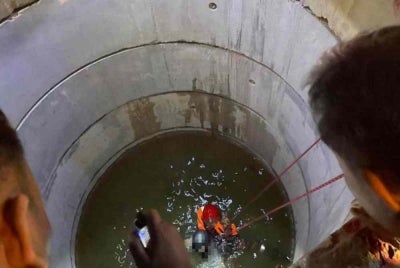Losing 16 medals at Commonwealth Games: Preparing excuses for underperformance? - Analyst
With the Glasgow 2026 Commonwealth Games just a couple of years away, concerns grew about the potential medal loss following the removal of 'favourite' sports, leading some to speculate that excuses for underperformance were being made prematurely.

SHAH ALAM - A local sports analyst has expressed surprise at Youth and Sports Minister Hannah Yeoh's statement about Malaysia potentially losing 16 medals at the 2026 Commonwealth Games, highlighting that it often seemed the country prepared excuses for underperformance in advance.
With the Glasgow 2026 Commonwealth Games just a couple of years away, concerns grew about the potential medal loss following the removal of 'favourite' sports, leading some to speculate that excuses for underperformance were being made prematurely.
While setbacks were easy to dwell on, the unpredictable nature of sports often defied expectations, and despite the statistics, competition could always deliver unexpected and thrilling outcomes.
Local sports observer Datuk Pekan Ramli voiced his surprise at Hannah's statement, noting that in sports, while competition could be unpredictable, no outcomes had been determined yet.
“It often seems we prepare excuses for underperformance in advance. For the Glasgow 2026 Commonwealth Games, there is no need for vague statements.
"Losing 16 medals due to the removal of our 'favourite' events is correct, but we should compete first.
“Malaysia should hope for the reinstatement of dropped events by 2030 and focus on a positive perspective rather than repeating the same narrative about losing medals due to event exclusions.
“Instead of regret, we should thank Scotland and the Commonwealth Games Federation for hosting and retaining events where we have good medal chances, like weightlifting and lawn bowls,” he told Sinar Daily when contacted today.

Pekan pointed out that badminton, diving, and squash had consistently been key contributors to Malaysia’s success at the Commonwealth Games, with badminton alone delivering 31 of the country's 67 gold medals.
However, he also acknowledged past setbacks, such as the 1986 Edinburgh Commonwealth Games, where Malaysia failed to secure a badminton gold.
“While no longer dominant in badminton, we remain competitive, despite growing European strength. In diving, we won three gold medals, starting with Pandalela Rinong in 2010, but we failed to win any at the 2022 Birmingham Games.
“Squash's last gold came in 2014 through Datuk Nicol Ann David. Based on these facts, it is fair to say Malaysia lost a potential gold in Glasgow with badminton not being contested.
“I believe we can secure gold medals in weightlifting and lawn bowls, as we have top athletes in these sports.
"Weightlifting, our second most successful sport after badminton, has contributed 14 golds and our world champion lawn bowlers are strong contenders.
“Powerlifting may also deliver a surprise in Glasgow,” he said.
When asked about the relevance and prestige of the Commonwealth Games, Pekan acknowledged that this perspective had indeed gained traction among developed Commonwealth countries and was increasingly accepted by many within the Commonwealth itself.
He stated that the growing sentiment around the Commonwealth Games’ diminishing significance could contribute to the perception that the exclusion of key sports like badminton was not a major loss.
He added that this shift in attitude suggested a broader acceptance of downplaying the importance of the Commonwealth Games in light of their perceived decline.
“Even renowned athletes from Commonwealth countries expressed similar views, with some withdrawing from the event, seeing it as lacking true competitiveness.
"They argued that winning a gold medal did not signify being the best in the world, as most top athletes came from non-Commonwealth nations. The younger generation questioned the need for the Commonwealth Games, viewing it as a reminder of colonial subservience despite independence.
"Many Commonwealth countries hesitated to host due to rising costs and uncertain returns, leading to doubts about its future. Glasgow's last-minute decision to reduce the event's scope raised concerns about whether the Commonwealth Games could sustain itself or would fade from relevance,” he added.
Agreeing with Pekan, sports analyst Graig Nunis stated that he viewed the Commonwealth Games as comparable to the Southeast Asian (SEA) Games, both occupying the lower tier of multisport events.
He said that many regarded it as a remnant of the colonial past, emphasising that there was no need for an event that served as a reminder of former British rule.
“After Australia’s Victoria pulled out as host in 2023 due to rising costs, several countries, including Malaysia, were approached to host, but many declined, highlighting the Commonwealth Games’ diminishing significance.
"Glasgow, Scotland, eventually stepped up, but with a scaled-down version featuring only 10 sports, including para-athletes.
"While Malaysia hosted the 1998 Commonwealth Games, creating a sense of attachment for some, it was no longer relevant today,” he said.
Graig highlighted that Malaysia earned 23 medals at the previous Commonwealth Games: seven gold, eight silver, and eight bronze. However, with the exclusion of key sports in Scotland, he had lower expectations, predicting that any gold medals would likely come from para-athletes or in bowls.
“With less than two years to go, the Commonwealth Games should be viewed as a valuable platform to give our junior athletes exposure and help prepare them for major competitions like the Asian Games and ultimately, the Olympics,” he added.
On Oct 23, Hannah announced that Malaysia was expected to lose 16 medals at the 2026 Commonwealth Games in Scotland after several medal-potential sports were dropped.
However, she emphasised that Malaysia still had opportunities in other sports like weightlifting and lawn bowls.
Her comments followed the Commonwealth Games Federation (CGF) confirming that only 10 sports would be contested in 2026, down from 19 in the previous edition.
The excluded sports included badminton, diving, and squash, while athletics, swimming, and weightlifting remained on the schedule.
Download Sinar Daily application.Click Here!















